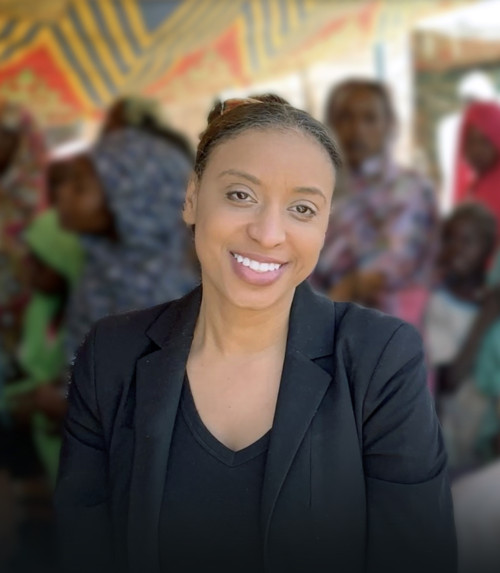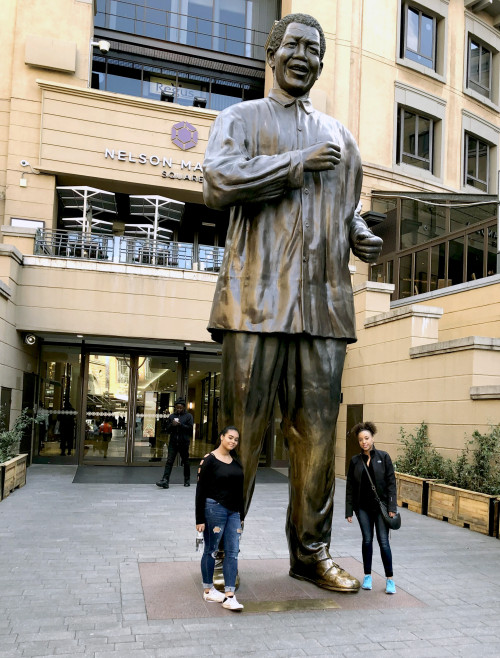From EOP to the State Department
Janette Yarwood Has Joined the
Biden/Harris Administration

Her vision became reality. She’s currently an anthropologist who is senior advisor in the Africa Bureau at the Department of State reporting to the assistant secretary for African affairs. The Bureau of African Affairs oversees the overall direction, coordination, and supervision of US policy toward the 49 countries in sub-Saharan Africa and the African Union. Yarwood is responsible for mid- to long-term policy and strategic priorities. “I am extremely happy to be back at the State Department and especially as the Biden-Harris administration works toward renewing the US relationship with African countries,” she says.
Second Time Around
The role is her second stint at the State Department. She formerly worked as chair of the Sub-Saharan Africa Area Studies at the Foreign Service Institute before she went to work for Congresswoman Karen Bass of California. As Staff Director, House Subcommittee on Africa, Global Health, Human Rights and International Organizations, she planned hearings, wrote legislation, attended State Department briefings, and planned congressional delegations. The job was busy, but rewarding. “Congress is the people’s house as they say. This means that I received hundreds of emails a day. I met with Nelson Mandela alerting me to particular issues, and think tanks or advocacy organizations that wanted to alert us or press us to do something about particular issues like human rights abuses,” she says.
Now, she’s grateful to think longer term. “I am in the fortunate position of being able to think about the broader policy issues. The African continent has a massive youth population; the median age of Africa’s 1.9 billion people is 19. This demographic shift can present opportunities and challenges,” she explains. “How will US policy pivot to engage this massive youth population? What does it mean when the new administration says ‘there is a need to renew US engagement with Africa?’ My role is to consider such questions and many others.”
Educational Opportunity
Yarwood came to Purchase through EOP (Educational Opportunity Program), which she credits with her success as a student here. EOP provides support and services for students who have not yet reached their full academic potential. The staff provide extra time and attention to keep students on track. “What that program did was let me know that I did not have to be defined by my past or my difficulties,” she says. “They believed in me and that helped me to believe in myself. They encouraged students; they made it a big deal when you made theDean’s List or took on a leadership role and so you wanted to do more of that.”
Director of EOP/MAP Programs Paul Nicholson remembers her well. “Janette is clearly on a trajectory with no ceiling and has been since she began her EOP pre-first year summer program back in 1992. It has been an absolute pleasure to watch her career success,” says Nicholson. “Janette has also been very gracious in giving back by speaking at the college and participating in EOP alumni panels for current students. She is truly one of our brightest stars.”
Paying It Forward
Her mentorship goes beyond working with Purchase students. She’s currently teaching a graduate course on Africa in international affairs at the George Washington University. “I believe in mentoring and passing on knowledge and this is part of that,” she says. “The readings are also helping me with my own work, so I am enjoying it.”
And it’s important. “I think that it is critical for students to understand the world, to see things comparatively, to under-stand that the American perspective is just one of many.”
It’s been a tough road working in foreign policy of late, but she sees hope in confronting the multiple crises that have unfolded here at home. “We can use the last few years to be in solidarity with countries around the world. This means acknowledging our own flaws and working to find real sustainable solutions. The killing of George Floyd and Breonna Taylor exposed serious inequalities and unequal treatment, and the massive protests showed that many Americans were willing to come out and call out the injustice.”
“The coronavirus pandemic highlighted serious racial and economic disparities. These can be used as strengths rather than weaknesses as we conduct our foreign policy. Imagine if a foreign affairs professional is able to highlight the ways the US government is working toward ensuring equal treatment for minority populations, not because it says it in the law, but because you can see it in the policies and ‘on the ground’ daily.”
Scrolling through Yarwood’s Twitter feed for just a few minutes reveals the depth and magnitude of the issues she faces in foreign policy. While it may seem overwhelming, she tries to keep it all in perspective. “In the midst of it all, you stay focused on the fact that you are in public service and it is a privilege and an honor to be able to serve. You also learn about some amazing young person doing something incredible and that keeps you going, too.”

Yarwood met her now ex-husband, artist Gabriel Pacheco ’96 (visual arts) at Purchase and their daughter Sade Torres Pacheco is currently finishing her sophomore year here, still undeclared. Not much seems to have changed. “From what she describes, Purchase seems very similar. I think it’s about the fact that students are open to exploring their interests.”
What’s Your Day Like?
“I was working on a strategic policy document for one country that is experiencing an armed conflict in one if its regions and I met with the charge d’affairs (that is the top embassy official when there is no ambassador), deputy assistant secretary for the region, the office director, and desk officer to discuss the document. Later that day, I met with the senior director for Sub-Saharan Africa at the National Security Council to discuss Africa priorities, and then I met with several think tanks to discuss their concerns about a particular country.
“On other days, I may be writing or clearing points for the assistant secretary or secretary, or questions for the record from congressional hearings on Africa to ensure that they are consistent with current US Africa policy. I could be attending an interagency meeting that was pulled together by the NSC (National Security Council) to discuss a particular region, issue area, or policy.”